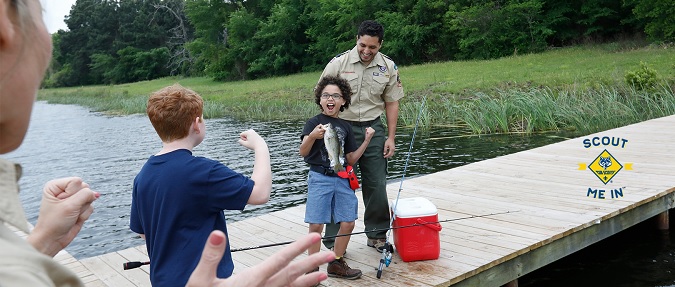
Ahead of Fish Amnesty Day, PETA Urges Organization to Stop Promoting Fishing, Dispense Badges for Animal-Friendly Activities Instead
With Fish Amnesty Day (September 22) on the horizon, PETA sent a letter to the Boy Scouts of America this morning calling on the organization to replace its fishing and fly-fishing badges with modern and humane ones that award scouts for animal-friendly survival skills, such as edible-plant identification and “trash fishing” (removing garbage from waterways).
“Fishing badges send impressionable young scouts the dangerous message that tormenting and killing sensitive sea animals will earn them a proverbial notch in their belts,” says PETA President Ingrid Newkirk. “This Fish Amnesty Day, PETA is calling on the Boy Scouts to award its members for eco- and animal-friendly accomplishments that make the planet a safer and cleaner place for everyone.”
PETA’s motto reads, in part, that “animals are not ours to abuse in any way.” For more information, please visit PETA.org. I can be reached at 202-483-7382, extension 2175, or MeganWi@peta.org. Please don’t hesitate to contact me if you have any questions.
PETA’s letter to Boy Scouts of America CEO Michael Surbaugh follows.
Michael B. Surbaugh, CEO
Boy Scouts of America
Dear Mr. Surbaugh,
I’m writing as a former Boy Scout on behalf of PETA and our more than 6.5 million members and supporters worldwide in advance of Fish Amnesty Day—a nonviolent alternative to National Hunting and Fishing Day on September 22—in which everyone is encouraged to celebrate fish rather than maiming or killing them. We encourage you to recognize that fish are intelligent, sensitive animals with complex nervous systems. Please, will you discontinue fishing and fly-fishing badges and instead replace them with badges that don’t promote the exploitation or endangerment of animals, such as a trash-fishing badge or an edible-plant identification badge, which would support activities that can be enjoyed by all scouts, including those who don’t fish for ethical or environmental reasons?
Every scout leader who supports fishing—which only teaches children to disrespect the environment and the animals who live in it—sends kids the dangerous message that it’s fun to torment and abuse animals. Fish are sentient beings with individual personalities who can recognize human faces, count, tell time, and retain memories, and they’re capable of feeling fear and pain—especially the pain of being hooked through their sensitive mouths, which have many nerve endings. And fish who are released after they’re hooked often die from their injuries and the loss of their protective outer coating. The Utah Division of Wildlife Resources reports that the “major cause of hooking mortality is [the] hooking injury itself,” as more than 60 percent of deeply hooked fish die after release and at least one out of three fish caught with bait dies after release. It should be no more acceptable to harm fish than it is to harm any other living, feeling beings.
Instead of fishing, you might consider encouraging a superior form of entertainment. “Trash fishing” is an eco-friendly activity that encourages scouts of all ages to spend quality time together helping animals and the planet by removing garbage from bodies of water that can potentially harm wildlife. Trash is a menace to animals: Whales, turtles, and seabirds often mistake it for food, and if eaten, it can choke them or cause fatal stomach or bowel obstructions. Birds frequently get their beaks wrapped or wings entangled in discarded fishing line, and hooks can be swallowed or become embedded in birds’ skin or beaks.
We believe that you have an opportunity to create a new modern, fun, educational, and fish-friendly badge that everyone would enjoy. We’ll be sending you a copy of Jonathan Balcombe’s fascinating book What a Fish Knows so that you can learn more about the intricate lives of fish. Thank you for your consideration. We look forward to hearing from you.
